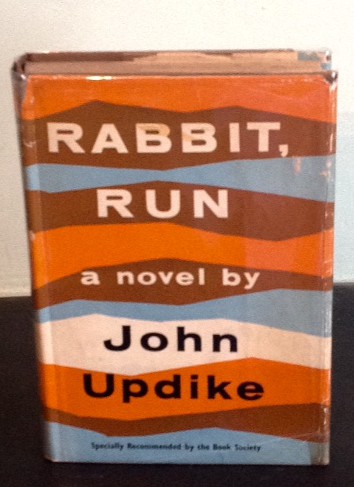Inspiring Older Readers
 posted on 30 Oct 2015
posted on 30 Oct 2015
Rabbit, Run by John Updike
I think it must be the best part of forty years since I read Updike’s breakthrough novel, Rabbit, Run. I have always told people, quite honestly, that I thought it was an impressive piece of work. In truth I had retained very little of the detail – what I had been left with was an impression, an atmosphere if you will, of a book that captured something important about modern life.
Reading it again now, I feel slightly abashed by my youthful indifference to what is, I now think, one of the very best novels of the second half of the twentieth century written in English. I’ve long believed that there are some writers you need to come to at the right time and callow youth is clearly the wrong time to be reading Updike – or it was for me at any rate.
Harry ‘Rabbit’ Angstrom is 26, handsome in his way, physically striking and an ex-basketball player, but he’s already trapped in his own version of a domestic, American suburban nightmare. He’s got a pointless job demonstrating kitchen ware, a pregnant wife he can’t abide and who is slipping into alcoholism and his two year old son Nelson to look after. We join his story at the moment he’s reached breaking and Rabbit decides to run. He gets in his car and heads ‘south’ – without knowing which way south is. This turns out to be typical of Harry because he can never quite get it together to reach escape velocity from any situation he puts himself into and he returns to his home town to seek out his old basketball coach hoping that he will have the answers he’s seeking.
Harry is at heart an opportunist and a chancer and when he falls into another relationship with Ruth, a former prostitute, she ends up pregnant. But Harry is too selfish to spot the pregnancy and in any case he can’t focus on any commitment - he finds himself assessing every woman he comes into contact with as a potential new conquest or partner. Although Harry sees the world reflected through the prism of his own ego, he is also at heart conservative and a sentimentalist who suffers attacks of conscience that draw him back to his abandoned wife when the new child is born.
Updike puts the reader in a position of power – we know this man and we know he’s going to run again. And he does. This time his decision to leave his wife alone has terrible consequences because she gets drunk and accidentally drowns the new baby in the bath. Again, over-burdened with conscience, he returns to take his place at his daughters funeral only to literally run away again to seek out Ruth and pledge his loyalty to her. At the end of the book, leaving her apartment to go to the grocery shop, Harry fails to take the first right turn into the store and keeps on walking........
The book is tremendously well written and given Updike was only in his late twenties when this book was published, it’s a really precocious piece of work. This novel is the first in what turned out to be a series of four that map out Harry Angstrom’s life and there are quite a number of fans of the books who see Rabbit as essentially sympathetic and even admirable – which, as I understand it, is not what Updike intended at all. He wanted to present Angstrom with no moral commentary, good or bad, but simply to truthfully record the world through his eyes. For me, however, Harry is the embodiment of the alienated citizen of a society that has lost its meaning and its moral compass. He isn’t just trying to run away from commitment, he’s trying to run away from himself and himself in the world.
Updike was a prolific writer and, for me, often a problematic one. I didn’t much like his politics but, boy oh boy, could he write when he was on song. I guess it’s inevitable that someone who wrote so much isn’t always going to write well and this was true of Updike because when he’s bad he’s really awful. However, when he’s good he’s so good I just want to read anything he’s done. I think his Rabbit cycle falls into the ‘really good’ box and I’ve still got another three to read – hurrah!
Terry Potter
October 2015